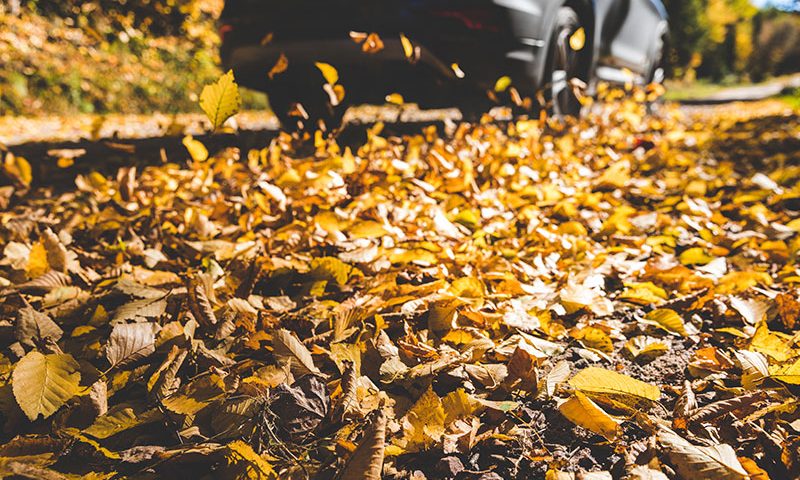Top tips for driving this autumn

In the blink of an eye, summer’s drawn to a close. With the turning of the leaves and shorter daylight hours, the inevitable autumnal changes are coming.
Top tips for driving in autumnal conditions…
Watch out for fallen leaves
Although the trees might look pretty with their autumnal colours, once they start to shed their leaves, it can make for some rather unpleasant driving conditions. Take extra care on tree-lined streets and country roads, and increase your stopping distance to account for potential skidding.
Be prepared for sun
While we’re big fans of summery autumn days, the glare from the sun can be quite dangerous and distracting, especially when it’s flickering through trees. Rather than squinting, we’d recommend keeping a pair of sunglasses in the glove compartment and use your car’s sun visor, as well as keeping your windscreen clean from smudges.
Look out for animals
With the shorter days, a lot of our furry friends are becoming much more active, especially deer. According to wildlife experts, October and November is rutting season. With more than 42,000 deer killed on the roads each year, it’s important to be aware of your surroundings, especially when driving in rural areas.
Be prepared for adverse weather conditions
Rain, fog, wind, and maybe even a bit of hail and ice…when autumn hits you never really know what the weather’s going to bring next. Although it might not be winter quite yet, the temperatures can drop without warning. If it looks like the temperature is going to be dropping below five degrees, prepare yourself for trickier driving conditions – go slow and keep your eyes peeled for any patches of black ice.
Check your lights are working
One of the worst things about autumn and winter is the short days, which means you’re going to be driving in the dark a lot more. Make sure you check your lights thoroughly and practice driving in the dark to build up confidence – particularly if you spend a lot of time driving in rural areas.
Prepare your car for autumn
While you might be mentally ready for driving in autumn, is your car? Take a look at our top tips for getting your car ready for driving this autumn.
Tyres
To be legally roadworthy, tyres need a tread of at least 1.6mm, but if they’re below 3mm, you’ll already find the grip wearing off – and you don’t want to be slipping and sliding around on wet roads. So make sure your tyres are in good condition.
Antifreeze
Top up your antifreeze and, if you’re unsure as to which one to use, get professional advice on which is the best for your car. Autumn can get chilly, so you don’t want your engine freezing up when the temperatures plummet.
Battery
Get your battery checked. Batteries don’t tend to last much longer than about five years, so if it’s on the wane, you’ll be wanting to replace it before the winter sets in and you’re left with a flat battery in the cold.
Bulbs
You should be checking your lights every fortnight or so throughout the year. But as autumn starts and the nights draw in, you’ll be using your lights increasingly more, so make sure they’re working. Make sure all your lights work — including your fog lights — and consult your handbook or a mechanic if you’re not sure how to change them.
Washer fluid
With rain, fallen leaves and maybe the odd bit of hail hitting your windscreen, it makes sense to check your washer fluid levels to help keep your vision clear. It’s also a good idea to replace the wipers themselves if you’ve had them for over two years.
All set to go now? Then drive safely, and keep us bookmarked so you can check out our regular driving news updates.



1 Comment
Hi, I was reading your top tips for Autumn and the statistic of 42,000 deer being killed on UK roads was very shocking to me. I looked into what else is being mullered and found out that approximately 1,500 people are killed yearly on UK roads along with approximately 140 cyclists. Not to mention 100,000 foxes and hedgehogs, 50,000 badgers, and 42,000 deers. Umm is it worth it, oh yeah pollution. I’m looking forward to this being my last car, and we need a proper nationwide system of cycle paths like the Netherlands, not paths that dissappear all of a sudden.